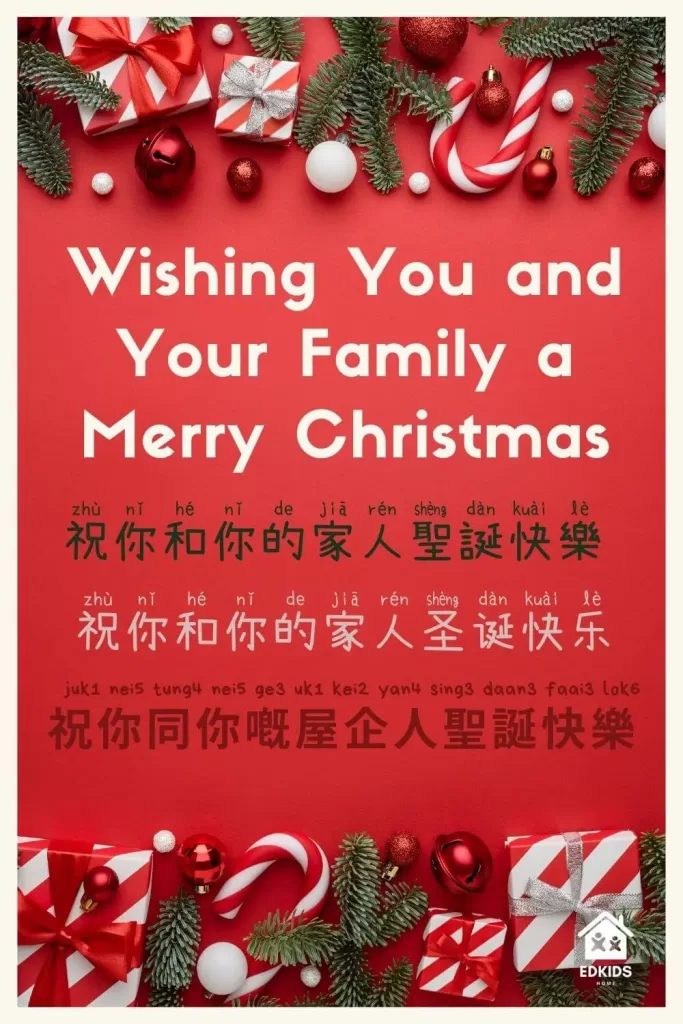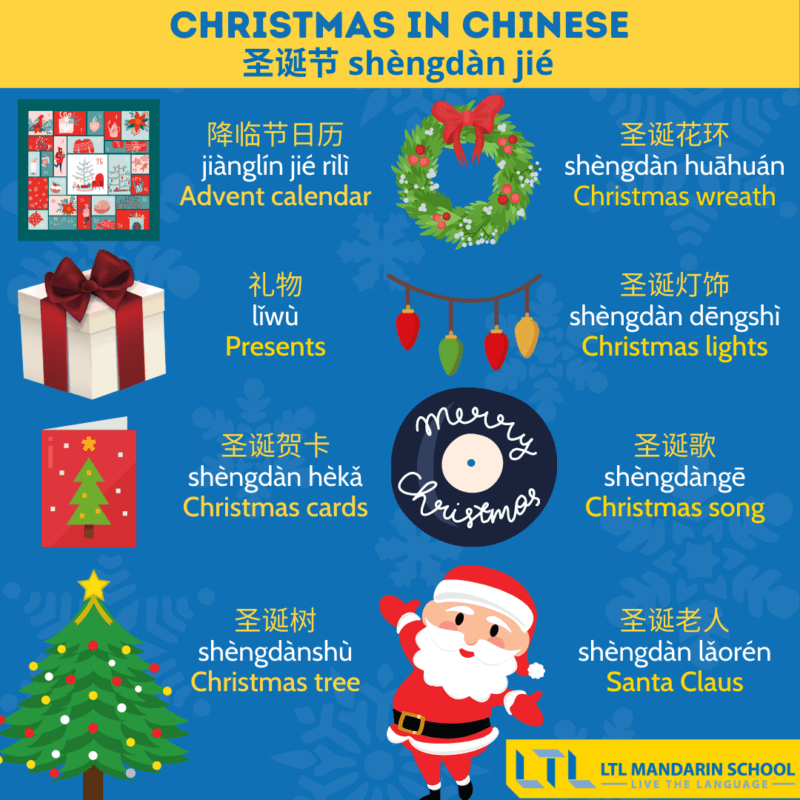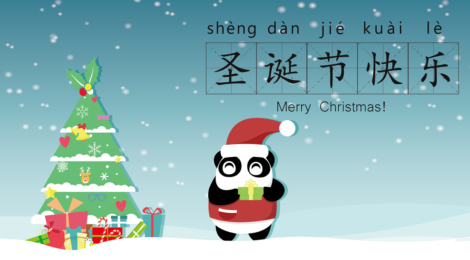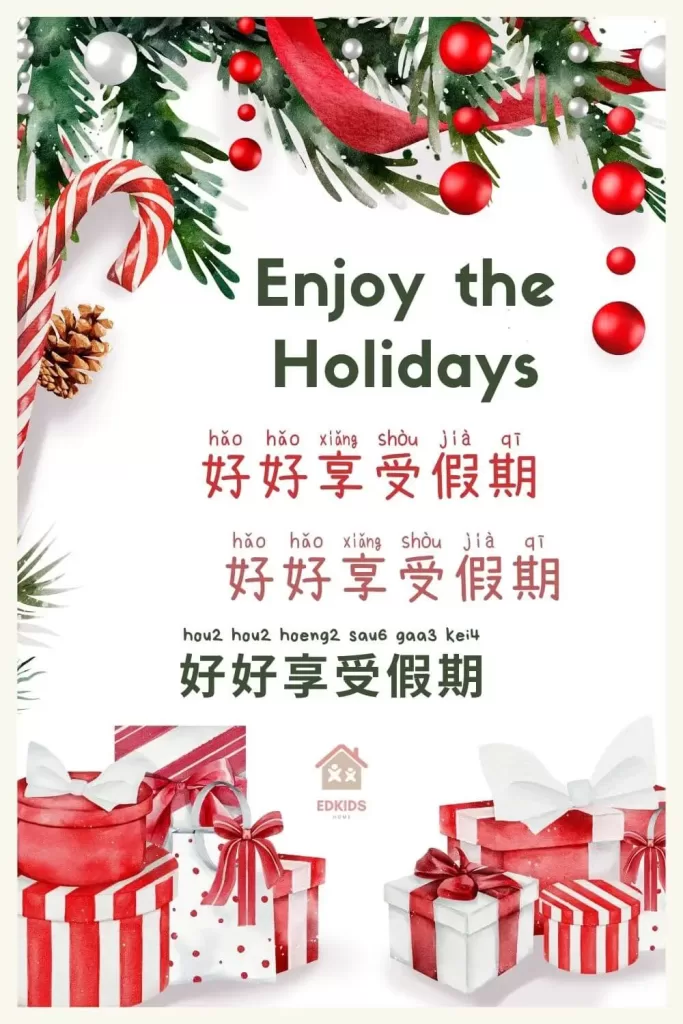Christmas Greetings in Chinese
Christmas is a time of joy and connection, celebrated worldwide with unique traditions and heartfelt greetings. In China, where cultural diversity blends with modern festivities, Christmas greetings often reflect both warmth and linguistic charm. Learning how to say Merry Christmas in Chinese—whether it's the popular 圣诞快乐 (Shèngdàn kuàilè) or other festive phrases—can deepen your appreciation for the holiday’s global spirit. This article explores common Chinese Christmas greetings, their meanings, and the cultural nuances behind them. Whether you're connecting with Chinese friends, colleagues, or simply expanding your language skills, these phrases will add a special touch to your holiday celebrations.
Christmas Greetings in Chinese: How to Spread Holiday Cheer
Common Chinese Christmas Greetings and Their Meanings
During Christmas, Mandarin speakers often use phrases like 圣诞快乐 (Shèngdàn kuàilè), which means Merry Christmas, or 新年快乐 (Xīnnián kuàilè) for Happy New Year. These greetings reflect warmth and goodwill. Another popular phrase is 平安夜快乐 (Píng'ān yè kuàilè), meaning Happy Christmas Eve, emphasizing peace.
| Chinese Phrase | Pinyin | English Translation |
|---|---|---|
| 圣诞快乐 | Shèngdàn kuàilè | Merry Christmas |
| 新年快乐 | Xīnnián kuàilè | Happy New Year |
| 平安夜快乐 | Píng'ān yè kuàilè | Happy Christmas Eve |
How to Pronounce Christmas Greetings in Chinese
Correct pronunciation is key to conveying your message. 圣诞快乐 (Shèngdàn kuàilè) is pronounced as Shung-dahn kwhy-luh. The tones are crucial: Shèng (4th tone), dàn (4th tone), kuài (4th tone), and lè (4th tone). For 平安夜 (Píng'ān yè), pronounce it as Peeng-ahn yeh, with Píng (2nd tone), ān (1st tone), and yè (4th tone).
See AlsoLanguages in China (300+ In Total) - A Complete Guide| Phrase | Pinyin | Pronunciation Guide |
|---|---|---|
| 圣诞快乐 | Shèngdàn kuàilè | Shung-dahn kwhy-luh |
| 平安夜 | Píng'ān yè | Peeng-ahn yeh |
Cultural Significance of Christmas Greetings in China
While Christmas is not a traditional Chinese holiday, urban areas celebrate it with festive decorations and exchanging greetings. Younger generations often use 圣诞快乐 to share holiday spirit, while businesses leverage it for marketing. Unlike Western countries, Christmas in China is more commercial than religious.
| Aspect | Observation |
|---|---|
| Religious Significance | Minimal; mostly secular celebrations |
| Commercial Influence | High; shopping and promotions |
| Youth Engagement | Strong among urban millennials |
Written Christmas Greetings in Chinese Characters
When writing Christmas greetings, use traditional or simplified Chinese based on the audience. For mainland China, use simplified characters like 圣诞节快乐. In Taiwan or Hong Kong, traditional characters like 聖誕節快樂 are preferred. Calligraphy adds elegance to cards.
| Simplified Chinese | Traditional Chinese |
|---|---|
| 圣诞节快乐 | 聖誕節快樂 |
| 新年快乐 | 新年快樂 |
When and How to Use Christmas Greetings in Chinese
Timing matters: Christmas Eve (平安夜) and Christmas Day (圣诞节) are the best times to greet. Use text messages, social media, or face-to-face wishes. In formal settings, pair greetings with 祝你 (zhù nǐ) meaning wish you, e.g., 祝你圣诞快乐 (Wish you a Merry Christmas).
See AlsoHow Appears If You Pass 365 Days On Duolingo: Rewards & Progress| Occasion | Recommended Greeting |
|---|---|
| Christmas Eve | 平安夜快乐 (Píng'ān yè kuàilè) |
| Christmas Day | 圣诞快乐 (Shèngdàn kuàilè) |
| New Year | 新年快乐 (Xīnnián kuàilè) |
What is the traditional Chinese Christmas greeting?

The traditional Chinese Christmas greeting is 聖誕快樂 (Shèngdàn kuàilè), which translates to Merry Christmas in English. This phrase is widely used in Mandarin-speaking regions, including Mainland China, Taiwan, and Hong Kong. While Christmas is not a traditional Chinese holiday, the greeting has become popular due to cultural exchange and commercialization.
- 聖誕 (Shèngdàn) means Christmas, derived from the Chinese term for holy birth.
- 快樂 (kuàilè) means happy or joyful, conveying well-wishes for the holiday.
- In Cantonese, the greeting is 聖誕快樂 (Singdaan faailok), pronounced differently but with the same meaning.
How is the Chinese Christmas greeting pronounced?
The Mandarin pronunciation of 聖誕快樂 is Shèngdàn kuàilè. Here’s a breakdown:
See AlsoHow I used a notebook to learn more Chinese, and why you should too- Shèngdàn (聖誕) is pronounced as shung-dahn.
- Kuàilè (快樂) is pronounced as kwhy-luh.
- In Cantonese, it’s Singdaan faailok, with a sharper tonal inflection.
Is Christmas widely celebrated in China?
Christmas is not a traditional Chinese festival, but it is celebrated in urban areas, especially among younger generations and in commercial settings. Key observations include:
- Major cities like Shanghai and Beijing feature Christmas decorations and sales.
- It is more of a secular than religious event, focusing on shopping and social gatherings.
- Some workplaces and schools may acknowledge the holiday, but it is not a public holiday in Mainland China.
Are there alternative Christmas greetings in Chinese?
Yes, besides 聖誕快樂, other variations exist depending on context and region:
- 聖誕節快樂 (Shèngdànjié kuàilè) includes the word 節 (jié), meaning festival, for emphasis.
- 新年快樂 (Xīnnián kuàilè) is sometimes used interchangeably, though it literally means Happy New Year.
- In Taiwan, 耶誕快樂 (Yēdàn kuàilè) is an alternative, using 耶 (Yē) for Jesus.
How do Chinese people typically celebrate Christmas?
Chinese Christmas celebrations often blend Western influences with local customs. Common practices include:
See AlsoWhat’s your next step to master Chinese?- Gift-giving and exchanging apples (a pun on Christmas Eve sounding like peaceful night in Mandarin).
- Dining out or attending festive events in malls and hotels.
- Young couples treat it as a romantic occasion, similar to Valentine’s Day.
What do Chinese people say on Christmas?

Common Christmas Greetings in China
In China, Christmas is not a traditional holiday, but many people, especially in urban areas, exchange greetings. Here are some common phrases:
- Shèngdàn kuàilè (圣诞快乐) – This directly translates to Merry Christmas and is widely understood.
- Shèngdàn jié kuàilè (圣诞节快乐) – A slightly more formal way to say Happy Christmas Day.
- Píng'ān yè (平安夜) – Refers to Christmas Eve, meaning Peaceful Night.
Christmas in Chinese Pop Culture
Christmas in China is often associated with commercial and social activities rather than religious significance. Key aspects include:
See AlsoLearning to read handwritten Chinese- Malls and decorations – Major cities feature elaborate Christmas displays.
- Gift exchanges – Especially among younger generations and coworkers.
- Western influence – Many restaurants and brands offer Christmas-themed promotions.
How Younger Generations Celebrate Christmas
Young Chinese people often embrace Christmas as a fun, social event. Common practices include:
- Parties and gatherings – Friends meet for dinners or nightlife.
- Christmas-themed dates – Couples treat it as a romantic occasion.
- Social media posts – Sharing festive photos with captions like 圣诞快乐.
Christmas vs. Traditional Chinese Festivals
Christmas is less significant compared to festivals like Chinese New Year. Differences include:
- No official holiday status – Christmas is not a public holiday in China.
- Less family-centric – Focuses more on friends and socializing.
- Commercial vs. cultural – Lacks deep-rooted traditions like Lunar New Year.
Regional Differences in Christmas Celebrations
Christmas observance varies across China:
- Tier-1 cities – Heavy decorations and events in places like Shanghai or Beijing.
- Smaller cities/rural areas – Minimal recognition, often just in schools or businesses.
- Christian communities – Attend church services, though they’re a minority.
How do you say wish you a merry Christmas in Chinese?

How to Say Wish You a Merry Christmas in Chinese
The phrase Wish you a Merry Christmas in Chinese is translated as 祝你圣诞节快乐 (Zhù nǐ Shèngdàn Jié kuàilè). Here’s a breakdown of the components:
- 祝你 (Zhù nǐ) means wish you.
- 圣诞节 (Shèngdàn Jié) translates to Christmas.
- 快乐 (kuàilè) means happy or merry.
Common Variations of Christmas Greetings in Chinese
There are several ways to express Christmas wishes in Chinese, depending on formality and context:
- 圣诞快乐 (Shèngdàn kuàilè) – A shorter, casual version meaning Merry Christmas.
- 祝你圣诞快乐 (Zhù nǐ Shèngdàn kuàilè) – A slightly more formal version.
- 圣诞节愉快 (Shèngdàn Jié yúkuài) – An alternative using 愉快 (yúkuài) for joyful.
Pronunciation Guide for 祝你圣诞节快乐
To pronounce 祝你圣诞节快乐 (Zhù nǐ Shèngdàn Jié kuàilè) correctly, follow these tips:
- Zhù sounds like joo with a rising tone.
- nǐ is pronounced nee with a falling-rising tone.
- Shèngdàn Jié is shung-dahn jyeh, with emphasis on the first syllable.
Cultural Context of Christmas Greetings in China
While Christmas is not a traditional Chinese holiday, it is widely celebrated in urban areas. Key points to note:
- Christmas is more of a commercial and social event than a religious one.
- Younger generations often exchange gifts and greetings like 圣诞快乐.
- Some people also use English phrases like Merry Christmas in informal settings.
Written Forms of Christmas Greetings in Chinese
In written Chinese, Christmas greetings can appear in different formats:
- Simplified Chinese: 祝你圣诞节快乐 (used in mainland China).
- Traditional Chinese: 祝你聖誕節快樂 (used in Taiwan and Hong Kong).
- Text messages often use abbreviations like 圣诞快乐 for convenience.
What is China's holiday greeting?

Common Chinese Holiday Greetings
In China, holiday greetings vary depending on the occasion, but some are widely used across festivals. Here are the most common ones:
- 新年快乐 (Xīnnián kuàilè) – Means Happy New Year and is used during the Lunar New Year.
- 春节快乐 (Chūnjié kuàilè) – Specifically for the Spring Festival (Chinese New Year).
- 中秋快乐 (Zhōngqiū kuàilè) – Used during the Mid-Autumn Festival.
Formal vs. Informal Greetings
Chinese holiday greetings can be formal or informal, depending on the relationship between speakers:
- Formal: 恭贺新禧 (Gōnghè xīnxǐ) – A respectful New Year’s greeting.
- Informal: 过年好 (Guònián hǎo) – A casual way to say Happy New Year.
- Business settings: 祝您节日快乐 (Zhù nín jiérì kuàilè) – Means Wish you a happy holiday.
Regional Variations in Greetings
Different regions in China may have unique holiday greetings:
- Cantonese: 恭喜发财 (Gōnghei fāchoi) – Common in Southern China and Hong Kong.
- Northern China: 大吉大利 (Dàjí dàlì) – Wishes for good luck and prosperity.
- Tibetan areas: 洛萨尔桑 (Losar Tashi Delek) – Used for Tibetan New Year.
Greetings for Specific Festivals
Certain holidays have dedicated greetings:
- Dragon Boat Festival: 端午安康 (Duānwǔ ānkāng) – Wishes for health and safety.
- Qingming Festival: 清明平安 (Qīngmíng píng'ān) – Focuses on peace and remembrance.
- Lantern Festival: 元宵节快乐 (Yuánxiāo jié kuàilè) – Celebrates the end of Lunar New Year.
Modern and Digital Greetings
With technology, digital holiday greetings have become popular:
- Text messages: Short phrases like Happy Holidays! in Chinese.
- Social media: Animated stickers with phrases like 福到 (Fú dào) (Luck arrives).
- E-cards: Virtual red envelopes with 吉祥如意 (Jíxiáng rúyì) (Good luck as you wish).
Frequently Asked Questions (FAQ)
What are common Christmas greetings in Chinese?
Christmas greetings in Chinese often include phrases like 圣诞快乐 (Shèngdàn kuàilè), which directly translates to Merry Christmas. Another popular phrase is 圣诞佳节愉快 (Shèngdàn jiājié yúkuài), meaning Happy Christmas holidays. These greetings are widely used in both Mainland China and Taiwan, though regional variations may exist. For a more formal tone, you might hear 恭祝圣诞 (Gōngzhù shèngdàn), which conveys respectful wishes for the season.
How do you pronounce Christmas greetings in Chinese?
Pronouncing Chinese Christmas greetings correctly is key to conveying your wishes authentically. For example, 圣诞快乐 (Shèngdàn kuàilè) is pronounced as Shung-dahn kwhy-luh, with tones playing a crucial role. The first character 圣 (Shèng) uses a falling-rising tone, while 诞 (dàn) has a falling tone. The phrase 新年快乐 (Xīnnián kuàilè), meaning Happy New Year, is often paired with Christmas greetings and pronounced Sheen-nyen kwhy-luh. Practice with native speakers or audio resources to master the tones.
Are Christmas greetings in Chinese used in all Chinese-speaking regions?
While Christmas greetings in Chinese are understood across Chinese-speaking regions, their usage varies. In Mainland China, Christmas is not a public holiday, but urban areas embrace festive greetings like 圣诞快乐 (Shèngdàn kuàilè). In Hong Kong and Macau, where Christmas is a public holiday, greetings are more prevalent. Taiwan also widely uses these phrases, though local dialects like Hokkien or Hakka may have unique variations. In contrast, Singapore and Malaysia blend Chinese greetings with multicultural influences.
Can Christmas greetings in Chinese be written in traditional and simplified characters?
Yes, Christmas greetings in Chinese can be written in both traditional and simplified characters. For example, 圣诞快乐 is the simplified version, while the traditional form is 聖誕快樂. The pronunciation remains the same, but the character complexity differs. Simplified characters are standard in Mainland China and Singapore, while traditional characters are used in Taiwan, Hong Kong, and Macau. When sending greetings, consider your audience's preference to ensure cultural appropriateness and clarity.
Leave a Reply

Related Posts